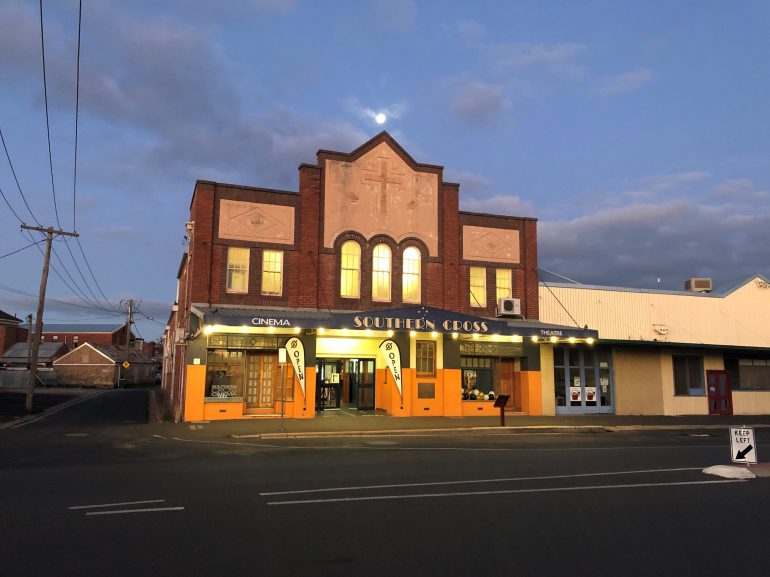Kate Sproston wants the cinema she manages to screen “interesting films”.
It’s a goal not as easily achieved in today’s climate as both independent and major exhibitors struggle amid delayed releases from overseas markets.
But the Southern Cross Theatre in the NSW South West Slopes town of Young, of which Sproston is the manager, is preparing to receive a welcome injection of international features, short films, and documentaries at the end of July via the Sydney Film Festival’s Travelling Film Festival.
Young has joined Lismore, Murwillumbah, Orange, and Warrawong as the new destinations for this year’s event, which has undergone one of the largest expansions in its 47-year history after receiving additional funding from Create NSW.
With a program tailored to each location, films are chosen in consultation with the cinema and/or local film society and include selections from the previous Sydney Film Festival.
The extended list of venues was initially planned for 2020, before the pandemic forced organisers to postpone their plans.
Given the impact of last year’s events on independent cinemas, Sproston believed the festival would provide a much-needed boost for her community.
“Bringing the big city film experience to a small country town is an absolutely great thing for the local residents,” she told IF.
“It’s the sort of films you generally wouldn’t be able to see without travelling to the city, so it’s a definite positive for film lovers.
“We have a lot of people that love film in the town, and they are definitely interested in seeing something that is a little bit out there and a little bit fancy.”
Young was one of a number of new towns considered for this year’s festival after organisers commissioned research on about 20 potential locations in 2016.
Criteria included practical elements, such as the presence of a cinema with a digital cinema package (DCP), as well as interest from the local community, sometimes gauged by the presence of a film society or other cultural groups.
Sydney Film Festival industry and guest manager Lisa Kitching told IF the event “could have easily visited five more towns” based on the level of demand, although the proper facilities were lacking in some areas.
“There were areas that were really keen when we started talking to them, but just didn’t have a proper cinema,” she said.
“They looked like they may have one soon, but just didn’t have one at present.
“We get a number of emails each year from smaller arts communities and councils asking for us to bring the festival to their community and the first question I always ask is, ‘Have you got a cinema?'”
She noted while the festival tended to visit centres where the cinema was “the heart of the community”, it was not always easy for the venues to find support.
“We go to a lot of venues Australia-wide, such as the Southern Cross Theatre in Young, that are often owned by the council, which put money into them, but not every community can,” she said.
“We also see a lot of cinema closures, not so much in NSW, but in Queensland, where cinemas that in town CBDs are closing, meaning we will move to the ones in the shopping centres, where there is often a multiplex.
“It’s a hard business, especially so last year, where you had cinemas closed for so long and then reopened with not much product.
“Cinemas need to keep going but they need product to do so.”

TFF isn’t the only festival extending its regional reach this year, with WA’s CinefestOZ having recently completed its inaugural Albany event.
Taking place across three days, CinefestOZ Albany included opening and closing night events, free community screenings, and a short film strand, as well as the Cinesnaps schools program, which offers a program of selected films, visiting filmmakers, online film content, and a short film competition.
There was also a bus tour available, showcasing locations within the town used for the CinefestOZ Film Prize winner, H is for Happiness.
US star Kate Walsh was on hand to help launch the festival, having remained in Perth for much of the pandemic period.
CEO Malinda Nixon said the event, which precedes the 14th annual CinefestOZ festival in WA’s Margaret River region at the end of August, had been “three or four” years in the making, following repeated requests from the community.
“We have a schools program which is quite comprehensive and seen as great for regional kids who may be disadvantaged and not able to access certain things,” she said.
“The opportunity to meet with filmmakers and experience different filmmaking techniques, while also viewing great Australian films was also seen as very desirable from the local community.”
She said organising CinefestOZ Albany had been an exercise in community development and integration.
“It wasn’t a matter of just popping a festival in a town; [the festival] had to have its own volunteer base and advisory committee,” she said.
“An event like this can help with a community’s sense of identity.
“From the council’s point of view, it provides economic opportunities, but we often get feedback from about the cultural importance of an event like this and all that it brings.”
Sydney Film Festival’s Travelling Film Festival will begin in Lismore on June 4.


